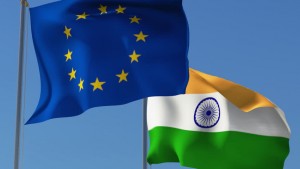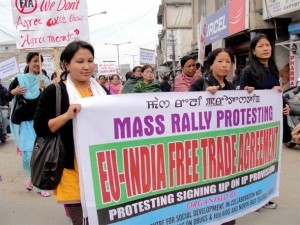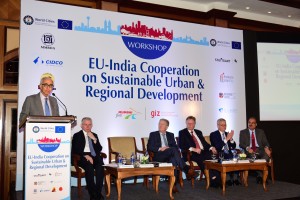India’s summit with the 28-nation European Union on March 30, after a gap of four years, has generated much interest, with both sides looking to impart fresh energy to this important relationship.
The Strategic Partnership between India and EU was established in 2004 at the Hague Summit, just four years after the decision to hold Annual Summits was taken in Lisbon in 2000. There was considerable enthusiasm when this visionary document was concluded. It was followed by a Joint Action Plan at the sixth Summit in New Delhi in 2005. Decision to launch negotiations for the India-EU Bilateral Trade and Investment Agreement (BTIA) was reached at Helsinki in 2006.
The then Indian PM Dr Manmohan Singh had set a target of 2 years to complete negotiations for the bilateral trade pact. Even at that time it was felt that this was an ambitious target, but it was felt that it was better to be aspirational rather than be modest and diffident. It was expected that if the goal could not be realized in two years, the parties will strive to conclude the negotiations soon after this deadline. No one could have visualized that the talks would drag on for more than 9 long years with no end in sight.
PM Modi’s visit to Brussels can be expected to impart a strong impetus to taking the negotiations forward not only on the subject of the bilateral Trade Agreement but also on the whole gamut of relations between India and European Union in political, security, strategic and developmental areas.
India-EU strategic partnership
The India-EU strategic partnership has failed to realize the promise and potential that was initially seen in the relationship. Regrettably, the relationship has continued to lose momentum over the last several years, particularly since 2009 when the EU was severely afflicted by the international economic and financial crisis which was immediately followed by the Eurozone sovereign debt crisis in Iceland, Greece, Ireland and Portugal. The EU is yet to extricate itself fully from that series of crises while other decisive developments and events have taken place on the international scene like the so called ‘’Arab Spring’’, conflict in Ukraine, rise of Islamic State (IS) and most recently the refugee influx from the Middle East and North Africa etc which it has been forced to contend with. These formidable challenges have sought to test all of EU’s resilience and resources. With so many critical issues jostling to demand its attention and energy, this large grouping of 28 member states finds itself in a difficult situation and unable to speak in a single voice. More recently, the issue of special provisions for Britain to continue as a member of EU has been keeping the latter fully occupied. The recent results in the German provincial elections resulting in rise of the far right at the expense of Chancellor Angela Merkel’s coalition will further sap the determination of political parties to take any far-reaching and bold reform measures.
On the India front also, matters since 2009 have not moved as smoothly as in previous years. The impact of several scams like 2G, CWG, Coalgate etc, the perceived policy paralysis and inability of the government to take decisions or any fresh initiatives, and the rapid decline in India’s economic growth rate from around 9% per annum in 2007 to sub 5% levels in 2013 were some of the causes for a lack of focus and rapid decline in bilateral engagement during UPA II rule.
It was, however, expected that contacts will be energized and relations will witness a quantum jump as has been in the case of USA, Japan and other countries after the swearing in of the Modi government in May, 2014. Modi did meet the then outgoing EU President Van Rompuy on the sidelines of the G20 Summit in Brisbane in Nov, 2014. He also met Presidents of the European Commission and European Council, Jean-Claude Juncker and Donald Tusk respectively, on the sidelines of the G20 Summit in Antalya in Turkey in November last year.
His proposed visit to Brussels in April, 2015 when he travelled to Paris, Berlin and Ottawa, however, could not materialise because of reported objections by Federica Mogherini, High Representative of the European Union for Foreign Affairs and Security Policy and Vice-President of the European Commission, who assumed charge of this position in Nov, 2014. Mogherini was Foreign Minister of Italy before moving to Brussels and had taken a strong stand on the ongoing case of shooting down of two Indian fishermen off the Kerala Coast by two Italian marines in Feb, 2012. Delay in responding to Indian interest in visiting Brussels led to the decision by India to skip a meeting with the EU leadership. Way was cleared for restoration of normal bilateral relations between India and EU after the UN Panel to which Italy had appealed, asked India in August last year to suspend the trial of the two marines.
What’s on agenda?
The one-day summit meeting in Brussels will take place after a long gap of four years.
Free Trade Area
The most important item on the agenda will be to give a strong push to expeditious conclusion of talks on the bilateral free trade pact. Discussions on BTIA were to resume in August last year but were called off by India at the last minute due to what it claimed to be arbitrary and unjustified action of the EU in imposing a legally binding ban on the sale of around 700 pharma products clinically tested by GVK Biosciences’. The ban, which was applicable to all 28 Member States, was for alleged manipulation of clinical trials conducted by Indian pharmaceutical research company GVK Biosciences. The Indian government was upset because most of the drugs banned by the EU had already been in the market for many years ‘without any adverse pharmaco-vigilance report from any member state’. It is understood that discussions to resolve this issue are currently underway.
The EU as a bloc of 28 countries is India’s largest regional trading partner while India was the EU’s 9th largest trading partner in 2014. India’s overall bilateral trade (in both goods and services) with the EU28 during 2014 (Jan-Dec) was € 95.51 billion (bilateral trade in goods €72.52 billion and bilateral trade in services €22.99 billion). India’s export to the EU in 2014 stood at € 48.21 billion while India’s imports from the EU were valued at € 47.33 billion. India’s bilateral trade in goods with the EU28 during the first nine months of 2015 (Jan-Sept 2015) stood at €58.9 billion comprising India’s exports valued at €30.3 billion and India’s imports from the EU at €28.6 billion. What is a matter of concern is that share of India’s trade with EU in EU’s total trade has been consistently declining since 1996-97. Moreover growth of India EU trade in recent years has been considerably slower than the overall growth of India’s external trade.
The EU continued to be one of the largest sources of Foreign Direct Investment (FDI) for India with FDI inflows from the EU to India valued at €4.956 billion in 2014. Indian investments in the EU28 were €1.078 billion in 2014.
After 16 rounds of talks, the last being in 2013, negotiations are currently stranded in disputes over EU demands to raise the equity cap on FDI in India’s insurance sector, reducing tariffs on imports of automobiles from current levels of 60-120%, lowering barriers on imports of wines and spirits, protection of intellectual property rights (IPR) and some others.
India has been seeking greater access for its services sector in EU. It is also concerned that the EU’s demand for stricter implementation of IPR rules might affect the country’s generic pharma industry or force the country to amend its patent law. India is also concerned at the recent move by UK to hike visa fees for skilled professionals as well as increase in minimum salary threshold for intra-company transfers.
India’s demands for granting “data secure status” by the EU and incorporation of an investment protection clause in the FTA need to be resolved amicably. The EU has so far refused to give India “data secure status” which has prevented the flow of sensitive data, including information vital for India’s IT services industry.
India’s Commerce Secretary recently led a delegation to Brussels to try and iron out the differences. One more meeting is expected to take place at the level of India’s Commerce minister and EU Trade Commissioner on 30th March on the sidelines of PM’s visit.
It is expected that differences will sought to be narrowed in these meetings and negotiators will be mandated to quickly conclude the negotiations.
Since 2013-14, India has unilaterally undertaken several reforms such as allowing 49 per cent foreign investment in insurance and pension, easing of foreign investment norms in banking, defence and railways sectors. It has also allowed 100 per cent FDI in telecom and single-brand retail, and even 51 per cent in multi-brand retail (though the BJP-led government is discouraging foreign investment in this sector).
After signing of the Trans Pacific Partnership Agreement in New Zealand in Feb, 2016, it is incumbent on both India and the European Union to seriously engage in and conclude negotiations on BTIA without further loss of time.
What’s in it for EU?
India is the fastest growing emerging economy with GDP growth of 7.6% in the current year and is expected to grow at a similar robust pace in the coming years. India has launched several big, new initiatives like Make in India, Smart Cities, Digital India, Skill India etc which should be of considerable interest to EU. It is observed that India’s collaboration with member States particularly Germany, France and UK is proceeding at an impressive pace. EU needs to ensure that the Group as a whole enhances and deepens its engagement with the rapidly expanding Indian economy to the benefit of all its member states.
To provide substance and heft to strategic partnership, it is essential for India and EU to further enhance and deepen their collaboration in areas of common interest and concern viz counter-terrorism, science and technology, climate change, education, green technology, clean energy, research and innovation, maritime security, Afghanistan, capacity development, development cooperation and others.
Modi will be spending only four hours during his stopover in Brussels in parleys with the EU leadership, the rest being taken up in his meetings with Belgian leaders. The Summit can however be expected to bring India-EU ties into sharp focus and impart renewed dynamism to them.
(Ashok Sajjanhar is a former ambassador of India and a commentator on foreign policy issues. This article has been written exclusively for India Writes Network)
Author Profile
- India Writes Network (www.indiawrites.org) is an emerging think tank and a media-publishing company focused on international affairs & the India Story. Centre for Global India Insights is the research arm of India Writes Network. To subscribe to India and the World, write to editor@indiawrites.org. A venture of TGII Media Private Limited, a leading media, publishing and consultancy company, IWN has carved a niche for balanced and exhaustive reporting and analysis of international affairs. Eminent personalities, politicians, diplomats, authors, strategy gurus and news-makers have contributed to India Writes Network, as also “India and the World,” a magazine focused on global affairs.
Latest entries
 DiplomacyJanuary 5, 2026India walks diplomatic tightrope over US operation in Venezuela
DiplomacyJanuary 5, 2026India walks diplomatic tightrope over US operation in Venezuela India and the WorldNovember 26, 2025G20@20: Africa’s Moment – The Once and Future World Order
India and the WorldNovember 26, 2025G20@20: Africa’s Moment – The Once and Future World Order DiplomacyOctober 4, 2025UNGA Resolution 2758 Must Not Be Distorted, One-China Principle Brooks No Challenge
DiplomacyOctober 4, 2025UNGA Resolution 2758 Must Not Be Distorted, One-China Principle Brooks No Challenge India and the WorldJuly 26, 2025MPs, diplomats laud Operation Sindoor, call for national unity to combat Pakistan-sponsored terror
India and the WorldJuly 26, 2025MPs, diplomats laud Operation Sindoor, call for national unity to combat Pakistan-sponsored terror










